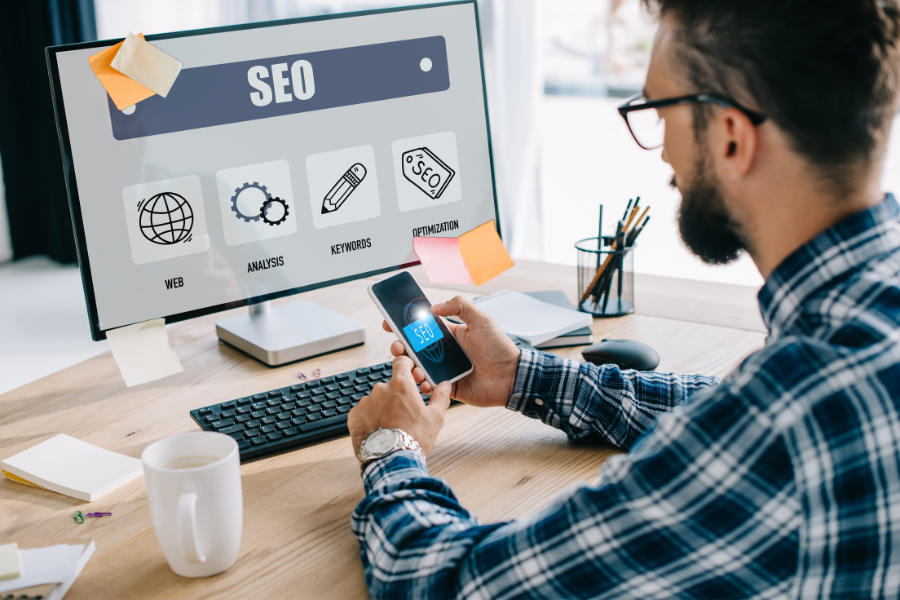Home / Functional Web Design / Web Design / eCommerce Web Design: The Ultimate Guide for Online Stores
Key Takeaways
- A well-designed eCommerce website is important for success in today’s digital marketplace, driving sales and building brand loyalty.
- User experience (UX) and user interface (UI) design are essential for creating an online store that is both functional and visually attractive.
- Choosing the right eCommerce platform depends on factors like budget, technical skills, and business needs, with popular options including Shopify, WooCommerce, and Magento.
- eCommerce SEO involves optimizing your website for relevant keywords to attract organic traffic and improve search engine ranking.
- Content marketing and link-building are important strategies for engaging your audience and establishing your brand as a trusted authority.
E-commerce has become an essential part of the modern business environment, enabling companies to reach customers worldwide through digital platforms. As more businesses change to online operations, having a well-structured and user-friendly website is essential for success. A well-executed eCommerce web design guarantees smooth navigation, increased conversions, and an overall better shopping experience.
Bless Web Designs specializes in eCommerce website development, offering expert services to businesses looking to enhance their online visibility. From selecting the right eCommerce platform to incorporating essential features like shopping carts and payment gateways, their expertise covers all parts of creating a high-performing online store. By focusing on UX design for eCommerce and staying updated with eCommerce web design trends, We help businesses build websites that drive sales, improve the customer journey, and build lasting brand loyalty.
Essential Elements of Effective eCommerce Web Design
Building an effective eCommerce website requires focusing on both design and functionality. It is important to create a website that looks good while also being easy to use. A well-designed website should offer a smooth and enjoyable experience for every visitor.

Here are the essential parts that make up successful eCommerce web design:
User Experience (UX) Design
User Experience (UX) Design focuses on making the online shopping experience easy and enjoyable. A confusing website or a difficult checkout process can cause visitors to leave without making a purchase. UX design aims to improve every part of the user’s journey, from browsing products to completing a transaction. Essential parts of UX design for eCommerce include:
- Intuitive Navigation – Clear menus, categories, and search functionality help customers easily find what they are looking for.
- Streamlined Checkout Process – A simple, straightforward checkout process minimizes cart abandonment and encourages conversions.
- Clear Calls to Action – Prominent buttons and compelling language guide customers towards desired actions, such as adding to a cart or making a purchase.
- Accessibility – Designing for users with disabilities guarantees inclusivity and a positive experience for everyone.
User Interface (UI) Design
User Interface (UI) Design focuses on the visual appearance of the website, ensuring it is both attractive and user-friendly. It aims to create an engaging experience that aligns with your brand’s identity and attracts customers. Important parts of UI design for eCommerce include:
- Color Scheme – Choosing colors that align with your brand and produce the desired emotions.
- Typography – Selecting fonts that are easy to read and visually attractive.
- Imagery – Using high-quality product images and lifestyle photos to showcase your offerings.
- Branding – Guaranteeing consistency in logo usage, brand colors, and messaging across the website.
Mobile Commerce (m-commerce)
With more people shopping on smartphones and tablets, it’s important to make sure your eCommerce website works well on mobile devices. Mobile commerce, or m-commerce, is the practice of shopping online using mobile devices, and it’s growing rapidly. Responsive design guarantees that your website automatically adjusts to fit different screen sizes and resolutions, providing a smooth and consistent experience for users on any device. This approach helps maintain the website’s appearance and functionality on desktops, laptops, tablets, and smartphones, providing a positive experience for every visitor.
eCommerce Features
To offer a full shopping experience, your eCommerce website must include essential parts that make browsing, selecting products, and completing purchases easy. These features help customers find what they need quickly and efficiently, ensuring a smooth shopping journey. These include:
- Product Pages – Detailed product descriptions, high-quality images, customer reviews, and related product suggestions.
- Shopping Cart – Allows customers to add products, review their selections, and adjust quantities before proceeding to checkout.
- Payment Gateways – Secure and reliable payment processing options to facilitate transactions.
- Customer Accounts – Enable customers to create accounts, track orders, save payment information, and manage preferences.
- Search Functionality – Enhance search capabilities that allow customers to quickly find exact products or categories.
By focusing on these important parts of eCommerce web design, you can build an online store that attracts customers and encourages them to make purchases. A well-designed website helps improve the shopping experience, which can lead to higher sales and greater customer loyalty. Investing in a good website design can increase brand awareness and strengthen your internet visibility.
Choosing the Right eCommerce Platform
Choosing the right eCommerce platform is an important step in building your online store. The platform you select will determine the functionality, design flexibility, and scalability of your website. With so many options available, it can be difficult to know which one is best for your business. Popular platforms like Shopify, WooCommerce, and Magento each have their own strengths and weaknesses, and it’s important to consider factors such as ease of use, cost, customization options, and the exact parts your store needs. We will provide you with helpful insights to guarantee you make the best decision based on your business goals and requirements.

Shopify
Shopify is a leading eCommerce platform known for its user-friendliness, scalability, and extensive app store. It is a hosted solution, meaning you don’t need to worry about technical parts like hosting, security, and maintenance.
Pros:
- Ease of Use – Even with limited technical skills, you can easily set up and manage your online store.
- Scalability – Shopify can accommodate businesses of all sizes, from startups to large enterprises.
- App Store – An extensive library of apps allows you to extend the functionality of your store and integrate with different tools.
- Themes and Customization – Different themes and customization options allow you to create a unique and visually attractive store.
Cons:
- Transaction Fees – Shopify charges transaction fees on sales unless you use their own payment gateway, Shopify Payments.
- Limited Customization – While themes offer flexibility, advanced customization may require coding knowledge or hiring a developer.
WooCommerce
WooCommerce is a popular open-source eCommerce plugin for WordPress. It’s a flexible and customizable solution that’s ideal for businesses already familiar with WordPress.
Pros:
- Flexibility – Being open-source, WooCommerce offers huge customization options and allows for deep integration with WordPress.
- Cost-Effectiveness – WooCommerce itself is free to use, although you will need to pay for hosting, domain name, and potentially premium themes or plugins.
- Community Support – A large and active community provides plenty of resources and support for WooCommerce users.
Cons:
- Technical Knowledge – Setting up and managing WooCommerce requires some technical knowledge, especially for customization and troubleshooting.
- Maintenance – You are responsible for maintaining and updating your WooCommerce store, including security and backups.
Magento
Magento is a strong and rich-in features eCommerce platform designed for large businesses with complicated needs. It offers extensive customization options and scalability to handle high volumes of traffic and transactions.
Pros:
- Scalability and Performance – Magento can handle large catalogs, high traffic, and difficult integrations.
- Customization – Offers exceptional flexibility for customizing every part of your online store.
- Features – Comes with a different built-in feature, including advanced marketing tools, multi-store management, and internationalization.
Cons:
- Complexity – Magento is a complicated platform that requires significant technical expertise to set up and manage.
- Cost – Magento can be expensive, especially for enterprise-level solutions and ongoing maintenance.
Other Platforms
While Shopify, WooCommerce, and Magento are among the most popular eCommerce platforms, there are other options worth considering:
- BigCommerce – A user-friendly platform with built-in features and scalability.
- Squarespace – A website builder with eCommerce capabilities, ideal for small businesses with simple needs.
- Wix – Another website builder with eCommerce functionality, offering drag-and-drop ease of use and a combination of templates.
Factors to Consider When Choosing the Right Platform
The best eCommerce platform for your business depends on your unique needs and goals. Consider these important factors when making your decision:
- Budget – Consider the platform’s cost, including transaction fees, hosting, and potential development costs.
- Technical Skills – Evaluate your technical expertise and comfort level with managing a website.
- Business Size and Complexity – Choose a platform that can accommodate your current needs and coming growth.
- Customization Needs – Determine how much flexibility you need to customize the look and functionality of your store.
- Features – Identify the essential parts you need, such as payment gateways, shipping integrations, and marketing tools.
By considering these factors, you can choose the eCommerce platform that best fits your business needs and helps you achieve your online goals. This approach guarantees that the platform you select will provide the right tools and features to support your growth.
Driving Traffic and Conversions with eCommerce SEO
Building an attractive eCommerce website is only the beginning. To grow in the competitive online marketplace, it is important to make sure your target audience can find your store. This is where eCommerce SEO becomes important. Without proper optimization, even the most well-designed website can go unnoticed by potential customers.

SEO, or Search Engine Optimization, involves improving your website’s ranking on search engine results pages (SERPs) to make it more visible to users. By targeting relevant keywords, optimizing product pages, and following SEO best practices, you can drive more organic traffic to your site. This approach helps increase brand awareness and improves your chances of converting visitors into loyal customers, ultimately boosting sales and business growth.
Keyword Research
To optimize your website effectively, you need to understand what your target audience is searching for. This is where keyword research plays an important part. Keyword research helps identify the words and phrases people use when looking for products or services similar to yours. By focusing on these keywords in your website content, you can improve your chances of showing up in relevant search results.
Tools like Google Keyword Planner, Ahrefs, and SEMrush can help you identify relevant keywords, analyze their search volume, and assess their competition. You can also gain useful insights by exploring Google Trends, analyzing competitor websites, and monitoring your own website’s search questions through Google Search Console.
On-Page Optimization
On-page optimization concerns making changes to your website’s structure and content to improve its visibility in search engines. This includes adjusting elements like titles, headings, and text to make your site more search engine-friendly.
Essential elements of on-page optimization include:
- Title Tags – Preparing compelling and keyword-rich titles for each page.
- Meta Descriptions – Write straightforward and informative descriptions that entice users to click through to your website.
- Header Tags (H1, H2, etc.) – Use header tags to structure your content and highlight essential information.
- Image Optimization – Optimizing images with descriptive file names and alt text to improve accessibility and search visibility.
- URL Optimization – Creating user-friendly and keyword-rich URLs.
- Content Optimization – Providing your content is high-quality, relevant, and incorporates target keywords naturally.
Content Marketing
Content marketing plays an essential role in attracting and engaging your target audience. By creating valuable and informative content, you can establish your brand as a trusted authority in your industry and drive traffic to your online store.
Types of content that can be effective for eCommerce businesses include:
- Blog Posts – Share informative articles, product reviews, and industry insights.
- Product Descriptions – Write clear and detailed descriptions that highlight the benefits and features of your products.
- Buying Guides – Help customers make informed purchasing decisions with complete guides.
- Videos – Create engaging product demos, tutorials, and behind-the-scenes content.
- Infographics – Present data and information in a visually appealing and easy-to-understand format.
Technical SEO
Technical SEO focuses on the technical parts of your website that affect its visibility in search results. It ensures that search engines can easily crawl and index your website and that users have a positive experience on your site.
Important parts of technical SEO include:
- Site Speed – Optimizing your website’s loading speed to improve user experience and search ranking.
- Mobile-Friendliness – Guaranteeing your website is responsive and provides a smooth experience on all devices.
- Site Architecture – Creating a clear and organized website structure that makes it easy for search engines to understand your content.
- XML Sitemap – Submitting an XML sitemap to search engines to help them crawl and index your website.
- Structured Data – Using structured data markup to provide search engines with additional information about your content.
Link Building
Link building is the process of acquiring backlinks from other websites to your own. Backlinks act as votes of confidence, signaling to search engines that your website is trustworthy and authoritative.
Effective link-building strategies for eCommerce businesses include:
- Guest Blogging – Contributing high-quality content to other relevant websites.
- Content Promotion – Promoting your content through social media, email marketing, and other channels.
- Industry Directories – Listing your business in relevant online directories.
- Partnerships and Collaborations – Cooperating with other businesses and influencers to create content and build links.
By implementing a complete eCommerce SEO strategy, you can increase your website’s visibility in search results, attract more qualified traffic, and drive more conversions. Remember, SEO is an ongoing process that requires continuous monitoring, analysis, and optimization.
Enhancing User Experience and UI Design for eCommerce
Creating a successful eCommerce website requires a combination of effective design, user experience, and strategic optimization. Essential parts such as responsive design, user-friendly navigation, and eCommerce parts such as shopping carts and payment gateways are essential for guaranteeing your online store runs smoothly. A well-designed website helps attract visitors, keeps them interested, and encourages them to make purchases. Focusing on mobile optimization, user experience (UX) design, and integrating essential eCommerce tools will create a smooth shopping experience that helps build customer loyalty and boosts conversions.

To make your online store visible to a wider audience, eCommerce SEO plays an essential role. By conducting thorough keyword research and implementing on-page SEO strategies, you can improve your website’s search engine rankings and attract more organic traffic. Along with optimizing your website’s structure and content, selecting the right eCommerce platform to suit your business needs is essential for long-term success. With the right design and optimization strategies in place, your eCommerce website can provide a smooth shopping experience, drive sales, and support the growth of your business.
Improve Customer Experience with Professional Design
Partnering with Bless Web Designs for your eCommerce website guarantees that your site looks professional and functions smoothly. Our expertise in eCommerce web design focuses on creating a website that is both visually attractive and user-friendly, providing a smooth experience for your customers. We specialize in creating mobile-friendly, user-centered websites that provide an easy shopping experience for your customers. With a strong focus on eCommerce SEO, we help increase your website’s visibility, driving more traffic and boosting conversions. Our team also guarantees your website is optimized with all the necessary eCommerce parts like secure payment gateways and easy navigation. Partnering with us gives you a customized approach that aligns with your business goals, helping you grow and succeed in the competitive online demand.
Start building your successful eCommerce store today with Bless Web Designs. Contact us now to get started on creating a website that drives sales and enhances customer loyalty.


